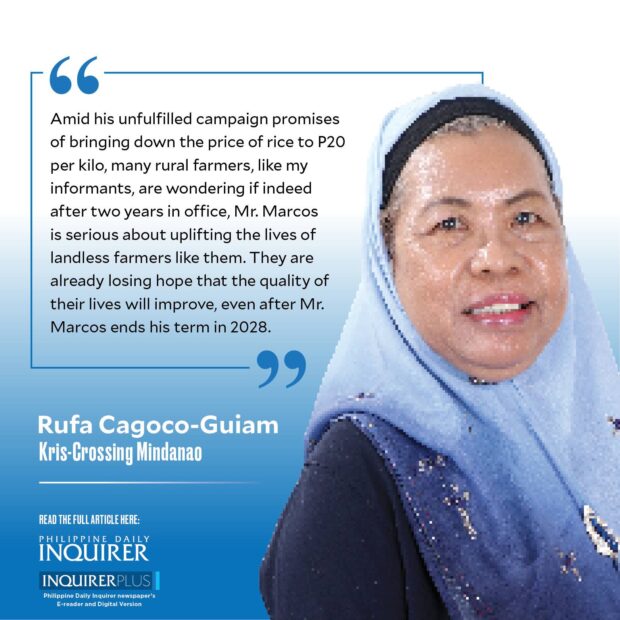Faces of worsening rural poverty
General Santos City—One of the highlights in President Marcos’ second State of the Nation Address (Sona) was his emphatic commitment to increase agricultural productivity and uplift the lives of farmers and fisherfolk in the country. While this has been a perennial refrain we hear from past presidents’ Sonas, and because Mr. Marcos is the concurrent agriculture secretary, it takes on an anticipated improvement of the lives of rural farmers, among whom are in the lowest rung of the agricultural hierarchy of workers—impoverished landless farmworkers. They are always at the mercy of their masters—the big farm owners.
In the avowed tuna capital of the country, several landless farmers in the rural barangay of Tinagacan, located near the boundary between General Santos City and the mountainous municipality of Malungon, Sarangani province, are reeling from the runaway daily increase of basic commodities like rice and fish products.
Article continues after this advertisementBig corn farm owners in the barangay call on rural landless farmworkers to do the actual farming, starting with soil preparation, planting, weeding, and harvesting. These corn farm owners skimp on costs related to the maintenance of the farms, like weeding, and ensuring that the corn plants produce good quality of corn ears. They let the corn in their farm fields grow on their own, alongside the pesty weeds that sometimes grow taller than the corn plants.
Some of these landless farmworkers shared with me their recent experiences. They reported that after a long day of back-breaking work harvesting corn and cutting the tall weeds that surrounded the corn plants, two of them ran a fever. During midday, it was blistering hot, but toward the early afternoon, it started to rain. But they continued their harvesting work since they were only able to fill one sack by midday. Their pay: a measly P60 per sack of corn harvested. Because they had to do double work, they were only able to gather two and a half sacks of corn between the two of them, which meant that they equally split the P150 they got from their joint harvesting efforts. Their low output was also because the corn ears they harvested were below standard size since the corn farm owners skimped on costs for weeding and fertilizing the farm. The amount they got was not enough to buy the anti-flu medicines they needed to take.
Their story is not unique to the sector they are part of. But one of them is already an elderly woman of 60, who has been a single mother for more than three decades of her life, after her husband deserted her and their two children. The other harvester is the elderly woman’s niece-in-law, who is the main income earner in her family of four children. Her husband lost his job after becoming physically incapacitated due to a job-related accident. Like her aunt, she works in various menial jobs, doing laundry for some well-off families, or as an on-call housekeeper for some of her acquaintances. According to the latest poverty data from the Philippine Statistics Authority (PSA), fisherfolk, farmers, and individuals residing in rural areas remain the poorest sectors in terms of subsistence incidence in 2021. This translates to more than 13 million rural-based Filipinos, more than 10 million of them children, among the rural poor. For sure, the families of the two rural farmers are part of this statistic.
Article continues after this advertisementAmid his unfulfilled campaign promises of bringing down the price of rice to P20 per kilo, many rural farmers, like my informants, are wondering if indeed after two years in office, Mr. Marcos is serious about uplifting the lives of landless farmers like them. They are already losing hope that the quality of their lives will improve, even after Mr. Marcos ends his term in 2028. They feel that the government, both at the national and the local levels, has turned a deaf ear to their plight. All talk about how important their roles are in attaining agricultural productivity is just that—all words, no action.
Comments to rcguiam@gmail.com

















